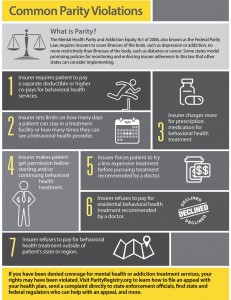Since 2008, federal law has required “parity” for most health insurance coverage of mental illness (including substance abuse) on the same terms as physical illness, and many states including Rhode Island impose additional requirements on nearly all health insurance coverage even in cases that would be exempt from federal rules. The Affordable Care Act of 2010 (“Obamacare”) further strengthened federal parity protections.

(Source: Kennedy Forum)
According to the National Alliance on Mental Illness (NAMI), parity means that in comparison with treatment for physical illness, patients seeking treatment for mental illness may not face higher costs or be limited to fewer visits; may not be subject to stricter pre-authorization; may not be denied services that are “medically necessary” and must be told the criteria for such determination; must have access to in-network providers taking new patients; and may not be denied residential or intensive outpatient (“partial hospital”) care including for substance abuse.
But there is no governmental enforcement of parity: the burden of making insurers comply with the law falls almost entirely upon patients. The RI Mental Health Parity Initiative – riparity.org – is a project of the Mental Health Association of RI (MHARI) that seeks to educate patients about their existing legal rights as well as provide assistance to patients needing to file formal appeals and complaints against insurers, including finding available in-network providers. The RI Parent Information Network (RIPIN) operates the state Health Insurance Consumer Hotline (401-270-0101) that “offers free support to any Rhode Islander who needs help accessing healthcare, health insurance, or special education for children with disabilities,” including issues with HealthSource RI, Medicare, and Medicaid. RIPIN Executive Director Samuel Salganik said in an MHARI press release, “ANY Rhode Islander, with ANY kind of health insurance problem can call us, and we’ll help you sort it out. Our service is FREE and our skilled staff guides callers through any problem from beginning to end, whatever it takes.”
Karen Malcolm, project manager for the parity initiative, said that the RIPIN hotline has a direct relationship with the state regulatory authority, the Office of the Health Insurance Commissioner (OHIC). “The Mental Health Parity Act, it’s been 10 years… it’s only within the last several years as states have begun to enact their own, and insurance commissioners are beginning to act on this in response to the significant rise in behavioral health care treatment needs, that we’re beginning to see change, and it’s slow. I would define the Mental Health Parity Act as aspirational, still.”
Rhode Island’s former US Rep. Patrick Kennedy recorded a five-minute video in which he says, “Insurance companies routinely deny coverage for mental health conditions and addictions, treating the brain as if it’s not really part of the body.” He was speaking on behalf of the non-profit Kennedy Forum that promotes brain health including mental health: Both Patrick and his father, Massachusetts’ former US Sen. Edward M. Kennedy, made health insurance a legislative priority and had well-publicized difficulties with substance abuse; the latter died in 2009 from an aggressive brain tumor.
A preferred provider organization (PPO) health insurance plan allows patients to choose either to use in-network providers who bill the insurer directly or out-of-network providers who must be paid up-front out-of-pocket by the patient before hoping to be reimbursed from the insurer. “A majority of providers don’t work in-network,” Malcolm said. Compared to physical medical providers, “Mental health providers need to go beyond what other providers need to do in terms of justifying a particular treatment,” she said. “It’s very difficult and a hassle for mental health professionals to get certified by insurers to be in-network… On top of that, once in-network, it’s very difficult for mental health providers to deal with insurers in regard to patient treatment. It takes a lot of time and energy for them and so a lot of them just say ‘Not interested.’” An especially dire shortage is mental health providers for children, she said.
A major problem is that insurance reimbursement rates for mental health care providers are, contrary to law, significantly lower if they choose to join an insurer network, discouraging many providers from becoming in-network and creating a shortage, according to a December 2017 study conducted by actuarial consultant Milliman commissioned by the non-profit Mental Health Treatment and Research Institute. The study found that in 2015 RI PPO plan out-of-network utilization for behavioral health relative to physical medical was for in-patient services 7.85x worse (18.3% v 2.3%), for out-patient services 5.36x worse (29.0% v 5.4%), and for office visits 3.98x worse (9.7% v 2.4%). The study also found that RI average insurance payment compared to Medicare allowance is 89.9% for behavioral health care and 107.2% for physical medical care, a 19.30% advantage for physical over behavioral.
Malcolm is optimistic about mental health care. “I actually think that we’re going to see it begin to improve because we’re putting a lot of pressure on the system to correct it. What we are experiencing right now is a public health crisis with the opioid epidemic, with the rise in children’s behavioral health care issues and our capacity to diagnose… so we have this sort of bloom of recognition now of mental health concerns and issues, [such as] autism… I personally think we are in the early phases of correction.”